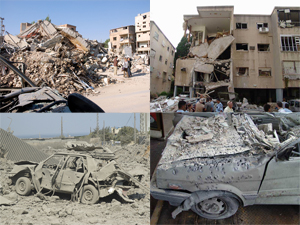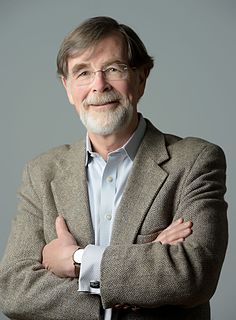Related Research Articles

Genocide is the intentional action to destroy a people—usually defined as an ethnic, national, racial, or religious group—in whole or in part. A term coined by Raphael Lemkin in his 1944 book Axis Rule in Occupied Europe, the hybrid word geno-cide is a combination of the Greek word γένος and the Latin suffix -caedo.
State terrorism refers to acts of terrorism which a state conducts against another state or against its own citizens.
Genocide denial is the attempt to deny or minimize the scale and severity of an incidence of genocide. Denial is an integral part of genocide and includes secret planning of genocide, propaganda while the genocide is ongoing, and destruction of evidence of mass killings. According to genocide researcher Gregory Stanton, denial "is among the surest indicators of further genocidal massacres".

Alexander Theodore Callinicos is a Zimbabwean-born British political theorist and activist. In an academic capacity, he serves as Professor of European Studies at King's College London. An adherent of Trotskyism, he is a member of the Central Committee of the Socialist Workers Party (SWP) and serves as its International Secretary. He is also editor of International Socialism, the SWP's theoretical journal, and has published a number of books.
The Responsibility to Protect is a global political commitment which was endorsed by all member states of the United Nations at the 2005 World Summit in order to address its four key concerns to prevent genocide, war crimes, ethnic cleansing and crimes against humanity.
Alexander William Lowndes de Waal, a British researcher on African elite politics, is the executive director of the World Peace Foundation at the Fletcher School of Law and Diplomacy at Tufts University. Previously, he was a fellow of the Harvard Humanitarian Initiative at Harvard University, as well as program director at the Social Science Research Council on AIDS in New York City.

United Nations Security Council Resolution 1674, adopted unanimously on April 28, 2006, after reaffirming resolutions 1265 (1999) and 1296 (2000) concerning the protection of civilians in armed conflict and Resolution 1631 (2005) on co-operation between the United Nations and regional organisations, the Council stressed a comprehensive approach to the prevention of armed conflict and its recurrence.
Edward C. Luck was an American professor, author, and expert in international relations. He served as the United Nations Secretary-General’s Special Adviser on the Responsibility to Protect between 2008 and 2012, appointed at the Assistant Secretary-General level. He was replaced by Jennifer Welsh of Canada. Previously he was Vice President of the International Peace Institute as well as the director of the Center on International Organization of the School of International and Public Affairs at Columbia University. He also served as Dean of the Joan B. Kroc School of Peace Studies at the University of San Diego between 2012 and 2013. From 2015 to 2021 Luck was the Arnold A. Saltzman Professor of Professional Practice in International and Public Affairs at the School of International and Public Affairs at Columbia University. He also served on the International Advisory Board of the Global Centre for the Responsibility to Protect.
Several scholars have accused the United States of involvement in state terrorism. They have written about the US and other liberal democracies' use of state terrorism, particularly in relation to the Cold War. According to them, state terrorism is used to protect the interest of capitalist elites, and the U.S. organized a neo-colonial system of client states, co-operating with regional elites to rule through terror. This work has proved controversial with mainstream scholars of terrorism, who concentrate on non-state terrorism and the state terrorism of dictatorships.

United Nations Security Council resolution 1265, adopted unanimously on 17 September 1999, in the first resolution to address the topic, the Council discussed the protection of civilians during armed conflict.

United Nations Security Council resolution 1366, adopted unanimously on 30 August 2001, after reaffirming resolutions 1196 (1998), 1197 (1998), 1208 (1998), 1265 (1999), 1296 (1999), 1318 (2000), 1325 (2000) and 1327 (2000) concerning aspects of armed conflict, the Council reiterated its aim to prevent armed conflict as part of its responsibility to maintain international peace and security.

United Nations Security Council resolution 1625, adopted unanimously at the 2005 World Summit on 14 September 2005, the Council adopted a declaration on the role of the Security Council in conflict prevention, particularly in Africa where many armed conflicts were taking place.

United Nations Security Council Resolution 1645, adopted unanimously on 20 December 2005, acting concurrently with the United Nations General Assembly, the Council established the United Nations Peacebuilding Commission to advise on post-conflict situations, in accordance with the declaration of the 2005 World Summit.
United Nations Security Council Resolution 1671, adopted unanimously on April 25, 2006, after recalling previous resolutions concerning the situation in the Democratic Republic of the Congo, particularly resolutions 1565 (2004), 1592 (2005), 1621 (2005) and 1635 (2005), the Council authorised the deployment of the European Union's EUFOR RD Congo force to assist the United Nations Mission in the Democratic Republic of the Congo (MONUC) during the 2006 general elections.

United Nations Security Council Resolution 1719, adopted unanimously on October 25, 2006, after recalling resolutions on the situation in Burundi, including resolutions 1545 (2004), 1577 (2004), 1602 (2005), 1606 (2005), 1650 (2005) and 1692 (2006), the Council established the United Nations Integrated Office in Burundi (BINUB) for an initial period of one year to assist in the country's long-term peace and stability.
During the 1971 Bangladesh war for independence, members of the Pakistani military and Razakar raped between 200,000 and 400,000 Bangladeshi women and girls in a systematic campaign of genocidal rape. Most of the rape victims of the Pakistani Army and its allies were Hindu women. Imams and Muslim religious leaders declared the women "war booty" and supported the rapes. The activists and leaders of Islamic parties are also accused to be involved in the rapes and abduction of women.

Thomas G. Weiss is a distinguished scholar of international relations and global governance with special expertise in the politics of the United Nations. He was named a 2016 Andrew Carnegie Fellow for a project exploring the concept of a world without the United Nations. Since 1998, he has been Presidential Professor at the Graduate Center of the City University of New York, and is Director Emeritus of the Ralph Bunche Institute for International Studies. At present, he also is Co-Chair, Cultural Heritage at Risk Project, J. Paul Getty Trust; Distinguished Fellow, Global Governance, The Chicago Council on Global Affairs; Global Eminence Scholar, Kyung Hee University, Seoul. In his spare time, he is a wood sculptor.
The Auschwitz Institute for the Prevention of Genocide and Mass Atrocities (AIPG) is a non-profit organization devoted to genocide and mass atrocity prevention. The institute is best known for its Raphael Lemkin Seminar for Genocide Prevention held annually at the Auschwitz concentration camp, and for serving as the technical secretariat of the Latin American Network for Genocide and Mass Atrocity Prevention.
John E. Cort is an American indologist. He is a professor of Asian and Comparative Religions at Denison University, where he is also Chair of the Department of Religion. He has studied Jainism and the history of Jain society over four decades, authored several books on Jainism, and is one of the editors of the forthcoming Brill Encyclopedia of Jainism. According to a review published in 2006 by Peter Flügel, the influence of the studies and publications of Cort on Jainism "have been immense", and in some respects dominated the field of Jain studies.
References
- ↑ http://viaf.org/viaf/search?query=local.names%20all%20%22Alex%20Bellamy%22&sortKeys=holdingscount&recordSchema=BriefVIAF
- ↑ "Professor Alexander Bellamy". polsis.uq.edu.au. 16 March 2021. Retrieved 16 March 2021.